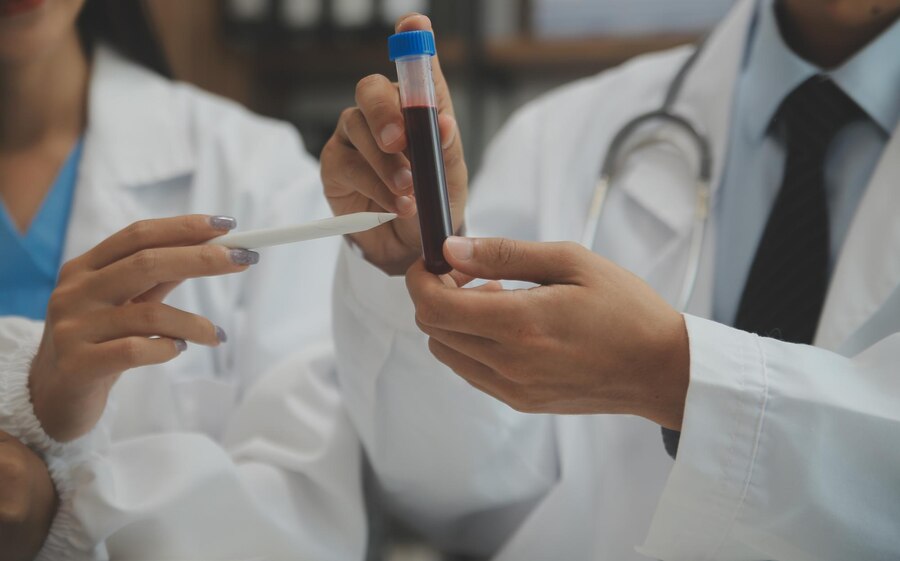The Importance of Laboratory Testing for Blood Glucose Management
 Blood glucose, also known as blood sugar, refers to the amount of sugar circulating in the bloodstream.Glucose is the primary source of energy for the body’s cells. When blood glucose levels are consistently elevated, it can lead to a serious health condition called diabetes.
Blood glucose, also known as blood sugar, refers to the amount of sugar circulating in the bloodstream.Glucose is the primary source of energy for the body’s cells. When blood glucose levels are consistently elevated, it can lead to a serious health condition called diabetes.
Types of Laboratory Blood Glucose Tests
1. Fasting Blood Glucose (FBG)
The fasting blood glucose test measures blood sugar levels after an individual has fasted for at least 8 hours. This test is a standard diagnostic tool for identifying prediabetes and diabetes.
Clinical Significance :
- Normal range: 70-100 mg/dL (3.9-5.6 mmol/L)
- Prediabetes: 100-125 mg/dL (5.6-6.9 mmol/L)
- Diabetes: ≥126 mg/dL (7.0 mmol/L) on two separate occasions
2. Random Blood Glucose (RBG)
Random blood glucose tests measure glucose levels at any time of the day without considering fasting. It is commonly used in emergency or initial diagnostic settings.
Clinical Significance:
- Blood glucose levels ≥200 mg/dL (11.1 mmol/L) with symptoms of hyperglycemia strongly indicate diabetes.
3. Oral Glucose Tolerance Test (OGTT)
The OGTT assesses the body’s ability to manage glucose over a specific period, usually 2 hours, after the administration of a glucose load.
Procedure:
- Measure baseline fasting glucose.
- Administer 75 grams of glucose orally.
- Measure glucose levels at 1 and 2 hours post-glucose intake.
Clinical Significance:
- Normal: <140 mg/dL (7.8 mmol/L) at 2 hours
- Prediabetes: 140-199 mg/dL (7.8-11.0 mmol/L)
- Diabetes: ≥200 mg/dL (11.1 mmol/L) at 2 hours
4. Hemoglobin A1c (HbA1c)
The HbA1c test provides an average blood glucose level over the past 2-3 months by measuring the percentage of glycated hemoglobin.
Clinical Significance:
- Normal: <5.7%
- Prediabetes: 5.7%-6.4%
- Diabetes: ≥6.5%
Clinical Applications of Blood Glucose Testing
-
Diabetes Diagnosis
Blood glucose testing is essential for diagnosing type 1, type 2, and gestational diabetes. The choice of test depends on clinical presentation and patient history.
-
Monitoring Glycemic Control
Regular testing helps monitor the efficacy of diabetes management strategies, including medication, diet, and exercise.
-
Screening for Gestational Diabetes
Pregnant women undergo glucose testing between 24-28 weeks gestation to screen for gestational diabetes.
-
Hypoglycemia Evaluation
Blood glucose levels below 70 mg/dL (3.9 mmol/L) indicate hypoglycemia, requiring immediate medical attention. Laboratory tests help identify underlying causes.
The Significance of Laboratory Blood Glucose Testing
Diagnosis of Diabetes:
- Laboratory tests, such as FPG and OGTT, are essential for the diagnosis of diabetes.
- Abnormal blood glucose levels can indicate the presence of type 1 diabetes, type 2 diabetes, or gestational diabetes.
Monitoring Treatment Effectiveness:
- Regular blood glucose monitoring through laboratory tests is crucial for individuals with diabetes to assess the effectiveness of their current treatment plan, including medications, diet, and exercise.
Identifying Treatment Adjustments:
- Laboratory test results help healthcare providers to make informed decisions regarding treatment adjustments, such as modifying medication dosages, adjusting dietary plans, or implementing lifestyle changes.
Preventing Complications:
- Consistent monitoring of blood glucose levels through laboratory testing can help to prevent or delay the onset of serious diabetes-related complications, such as heart disease, stroke, kidney disease, and nerve damage.
Personalized Treatment Plans:
- Laboratory test results provide valuable information that helps healthcare providers to develop personalized treatment plans tailored to the individual needs and specific circumstances of each patient.
Preparing for Laboratory Blood Glucose Tests
-
Fasting:
- For fasting blood glucose tests, it is essential to fast for the recommended duration, typically 8-10 hours, before the test.
- This means no food or beverages except water should be consumed during the fasting period.
-
Medications:
- Inform your healthcare provider about any medications you are currently taking, as some medications may affect blood glucose levels.
- Your doctor may advise you to adjust your medication schedule before the test.
-
Follow Instructions Carefully:
- Follow any specific instructions provided by your healthcare provider regarding the test procedure, including any dietary restrictions or necessary preparations.
Interpretation of Results
Factors Influencing Results
- Diet:Recent meals can significantly affect glucose levels.
- Medications: Steroids and other drugs may raise blood glucose.
- Health Conditions: Liver disease, hormonal imbalances, and stress can alter glucose metabolism.
Common Scenarios
- Elevated Glucose: Suggestive of diabetes, stress response, or hyperthyroidism.
- Low Glucose: May indicate insulin overdose, adrenal insufficiency, or prolonged fasting.
Conclusion
Laboratory testing plays a vital role in the diagnosis, management, and prevention of diabetes and other related conditions. Accurate and timely blood glucose measurements provide valuable information that helps healthcare providers make informed treatment decisions and ensure optimal blood sugar control. By adhering to recommended testing guidelines and working closely with your healthcare provider, you can effectively manage your blood glucose levels and reduce the risk of serious health complications.
Contact our Laboratory testing services for blood glucose levels check (469) 805-4561 or visit us https://specialtycareclinics.com/locations/fort-worth/
